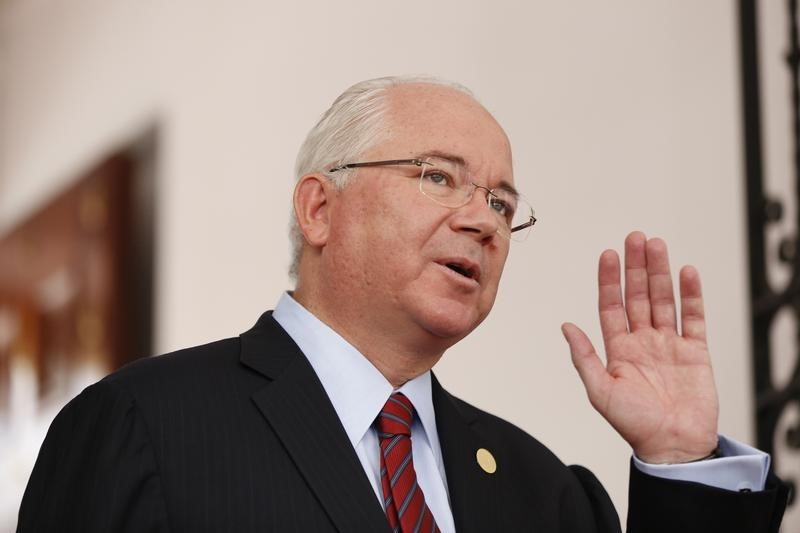By Marianna Parraga
NEW YORK (Reuters) - Venezuela, whose economy has been decimated by low oil prices, this month will unveil a bold new strategy to revive them, taking a page from OPEC's history books with a proposed price band to build an automatic floor for prices at $70 a barrel.
In an exclusive interview with Reuters, Venezuela's long-time oil minister and current United Nations ambassador Rafael Ramirez said the proposal – to be presented to a meeting of OPEC technical advisors on Oct. 21 – would reapply the old mechanism of progressive production cuts to control prices, with a "first floor" of $70 per barrel and a later target of $100 per barrel.
"We will try to progressively recover the price," he said, while acknowledging that the Latin American nation could face an uphill battle in convincing other major oil producers to go along with the proposal.
Ramirez's comments provide the first detailed public insight into Venezuela's months-long global effort to drum up support for measures to revive oil prices.
President Nicolas Maduro, whose party could struggle to maintain control of Congress in a coming election, has hinted at a need to address the lowest prices in six years at a series of meetings with counterparts from Russia, Qatar, Mexico and others.
Venezuela, which is heavily dependent on oil exports, is facing a surging triple-digit inflation rate and scarcity of goods such as food and medicines due to a lack of dollars to pay for imports.
In addition, its budget, like those of other OPEC producers from Nigeria to Ecuador, has been ravaged by the downturn that has contributed to economic instability.
But previous calls for production cuts over the last year have failed as Gulf countries such as Kuwait say they are not needed.
OPEC used the band system until 2005, when it was scrapped as prices exceeded its upper end due to soaring demand.
Ramirez, who once ran state-owned PDVSA, said he agrees with Saudi Arabia's idea that it is "essential" that non-OPEC countries like Russia and Mexico participate in output cuts this time. He added that the Saudi position is "fair" as the market is oversupplied by some 2 million barrels per day (bpd) of crude.
But he acknowledged forging a consensus may be tough.
"There's a severe disagreement problem within OPEC," he said. "We have not been able to react in a timely way this time and reach a consensus, as we did in 2008."
He also said that Caracas had been proposed as the location for the technical session, where the Venezuelan team plans to discuss the price discounts that many producers are giving to customers.
"We need to avoid having competition for market share driving us to price manipulation," he said. Discounts have contributed to the current low price situation."
GEOPOLITICAL ISSUES
As a policy, OPEC has not openly targeted specific prices for over a decade, ever since it abandoned a $22 to $28 "band" instituted after prices crashed in the late-1990s, but officials still speak of a fair or reasonable price.
By roughly 2010, that view had shifted up to around $100, a mark that OPEC managed to maintain for most of the previous five years. Ramirez said that was "assimilated without any problems by the market"
But $100 oil encouraged expensive-to-develop rival supply sources such as U.S. shale oil that eroded OPEC's market share. So big OPEC producers shifted policy in 2014 by refusing to cut output to support prices.
Talk of a fair price resurfaced this year. Iraq, Venezuela and Angola said in June that $75 or $80 could be just fine, but Saudi Arabia has not said what it sees as fair.
Ramirez, who supports calling an OPEC summit for heads of state, said geopolitical issues in countries from Libya to Russia are thwarting an agreement in this price crash.

"We have to intervene in the market (but) this situation is not going to be fully solved by ministers. It requires presidents to reach a political agreement."